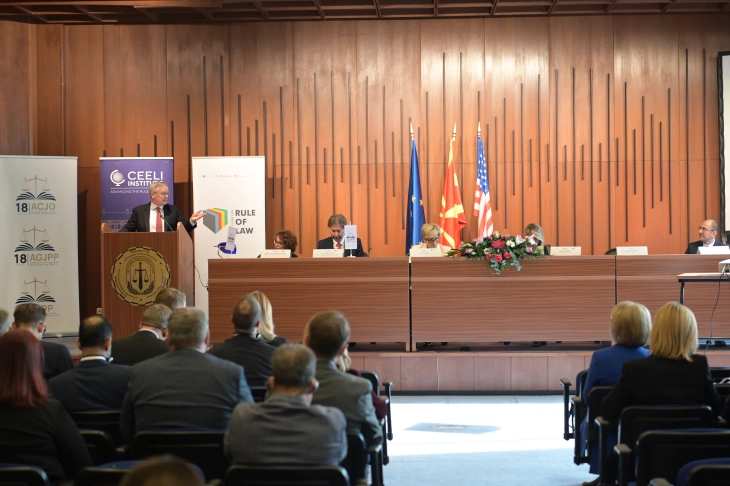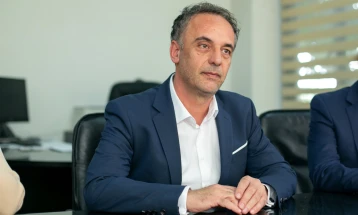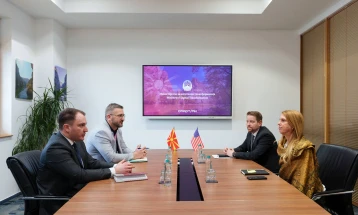Strengthening judicial accountability, independence, public trust key for EU integration: judicial conference
- Strengthening judicial accountability, independence, and public trust are key for integration into the European Union, while the judiciary must express its beliefs publicly and strongly through sustained activism. These were some of the main messages addressed at the judicial conference organized by the CEELI Institute and "EU Support for Rule of Law in the Republic of North Macedonia" project, held Nov. 19-20 in Skopje.

Skopje, 19 November 2024 (MIA) - Strengthening judicial accountability, independence, and public trust are key for integration into the European Union, while the judiciary must express its beliefs publicly and strongly through sustained activism. These were some of the main messages addressed at the judicial conference organized by the CEELI Institute and "EU Support for Rule of Law in the Republic of North Macedonia" project, held Nov. 19-20 in Skopje.
The conference comprises panel discussions on current challenges and possible solutions for ensuing independence of the judiciary, and aims to provide a roadmap for reforms that will create an independent, transparent, and accountable judiciary in North Macedonia, in line with international standards and public expectations.
Head of the Pavel Shatev Academy for Judges and Public Prosecutors, Irina Trajkoska Strezoski, said that maintaining independence and accountability, as well as ongoing reforms for strengthening the judiciary, remain a key priority on the path to EU integration, and the Academy's main vision is building a European profile of judges and public prosecutors, and of the judicial and prosecutorial administration through starter and continuous trainings.

"The Academy's mission is promoting and ensuring independent, impartial, highly professional and efficient judiciary that will affirm the rule of law principle and ensure protection of human rights. The goal is to create a modern judicial system based on European values, fully harmonized with European acquis that will incorporate international standards, with the intention of increasing public trust in judicial institutions," Trajkoska Strezoska explained.
Supreme Court President Besa Ademi stressed that the judiciary mustn't be distanced from its views and commitments, but should publicly, loudly and strongly express them through judicial activism.
"One cannot speak of judicial independence while intentionally reducing the judicial budget, despite the established legal minimum. One cannot speak of judicial independence while using political calculations and motives that don't belong to the jurisdiction of the judiciary. Disproportionate influences from different centers of power pose a risk of corruption. We need full legislative, functional and financial independence," Ademi noted.
CEELI Executive Director and one of the co-organizers of the event, Robert Strang, pointed out that independence is key for the work of judges, and that EU and US recommendations are a good idea, given the importance of ensuring the independence of the judiciary in the EU pre-accession process.

"Regarding the topics that will be discussed today, there is one challenging issue that many countries in the region are working on – the pre-vetting or full vetting process. I know it’s a complicated issue. We have a guide that will respond to this issue. We discussed the vetting process with various countries, countries that want to introduce vetting and get a clearer picture. From the outside, vetting seems like a wonderful idea, it prevents corruption, but we have to keep in mind that it can be used in a variety of situations. It's a complicated question, and I hope we'll have a nice discussion," Strang said.
Judicial Council President Vesna Dameva stated that the topics discussed today are not new but have been relevant for some time now.
“Finally, it is necessary to put an end to irresponsible judges, their dependence on anyone and in any way. and everyone must answer for their unprofessional and unconscionable behavior, especially when it is provoked by certain influences. Every judge is obliged to protect their own integrity and must not allow the judiciary to be abused for personal or political purposes; that is the only way to restore public trust," Dameva stressed.
Grzegorz Borkowski, member of CEELI’s Guidelines on Judicial Vetting Editorial Board in Poland, pointed out that the fact that the entire judicial panel is present at today's event, shows not only the importance of the topics discussed, but also sends a message of unity.
"We gathered here today to discuss and show that there is unity in the judicial system. As judges and public prosecutors, our job is to serve the people and society; we must not forget that we are not better than them. We also play an important role and must serve as an example by showing unity. If we don't win over people's trust, very soon the politicians will take over," Borkowski added.

Nicole Varnes, Deputy Chief of Mission at the US Embassy in Skopje, stressed the importance of focusing on solutions, and not the problems.
"The citizens in this country have a very high opinion of the judiciary and express a desire for greater efficiency, independence and transparency. Distrust in the judiciary and belief that judicial bodies are working against them is causing apathy and leading them to seek opportunities outside of the country. Let's talk about the changes we can make, for greater transparency, accountability of judges and courts," said Varnes.

At the end of Tuesday’s event, attendees are set to discuss accountability in the judiciary, disciplinary actions against judges, and alternatives to vetting in court.ssh/ad/
Photo: Academy for Judges and Public Prosecutors
Video: Aslan Vishko







